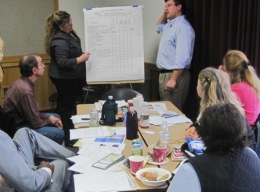
(Photos: Patrick Croasdaile for BikePortland)
The rolling country roads around Wilsonville make for a great place to ride. At the Wilsonville Bicycle Tourism Workshop last week, stakeholders discussed strategies aimed at harnessing the area’s scenery as a means of bringing more riders into the area to spark economic activity and boost job creation. The workshop was part of a countywide initiative led by Travel Oregon and the Clackamas County Tourism Commission.
“With the growth of the city, I don’t feel like I can comfortably ride [Wilsonville Road] to Newberg. It feels like the bricks are falling. We need the French Prairie Bridge.”
— Pat Rehberg, Wilsonville resident
While the group discussed a variety of topics aimed at getting more people to bike (and spend money) in the area, one issue dominated proceedings: the lack of an adequate river crossing for walkers and bikers in the area and the need to build the French Prairie Bridge, which would connect Wilsonville to Oregon’s marquee bike tourism route — the Willamette Valley Scenic Bikeway.
Many at the meeting expressed the belief that an improved river crossing at Wilsonville — either by way of the French Prairie Bridge, improved vehicular/shuttle services, or re-striping the shoulder of the I-5 (Boone Bridge) — would open up a plethora of possibilities for bicycle tourism in the region. In light of recent revelations about the Canby Ferry’s uncertain future, discussion of a permanent link across the Willamette River is all the more pressing.

Following presentations by County and City officials, Pat Rehberg — a local active transportation advocate — took the floor to share her view of conditions for recreational cyclists around the city. A Wilsonville resident since 1998, she said, “I wish I could say [recreational cycling] has taken off like wild fire here. Unfortunately it hasn’t.” Rehberg explained that this was in large part due to the lack of an adequate river crossing in Wilsonville.
“The longer I lived here, the more it seems like the biking opportunities are shrinking. With the growth of the city, I don’t feel like I can comfortably ride [Wilsonville Road] to Newberg. It feels like the bricks are falling. We need the French Prairie Bridge. You cannot safely ride the Boone Bridge anymore since the City gave Charbonneau a dedicated lane headed northbound.”

discuss strategies for increasing
bicycle tourism.
Mayor Knapp responded to Rehberg’s comments by saying that the City Council was skeptical of the bridge’s value to the community. He also believed that South Metro Chamber of Commerce was standing in the way. Regarding their combined opposition to the bridge, he said,
“They’re looking at the $20 million price tag and that’s all they see. Right now, if we voted on it, it would fail. This is really unfortunate because the bridge would benefit everyone. The Chamber ought to be very interested in bike tourism, and this bridge is one of the keys to making it a reality. There’s not enough recognition that the bridge and connectivity are what we need, nor are there enough people talking about it and supporting it.”
Jennifer Johnson, the Chamber’s representative at the workshop indicated that the Chamber was not opposed to the idea of a bridge. Relaying a message from the group’s president, she said the Chamber did not feel that the City had stressed enough of the bridge’s potential economic benefit for the community or addressed it’s potential impact on the Old Town neighborhood in Wilsonville.
While the City is stalled on action regarding the bridge, Wilsonville is making gains in its efforts to improve connectivity within the city. Jeff Owen, the City’s Bike and Pedestrian Coordinator, has been instrumental in these improvements.
In an email sent to me following the meeting, Owen wrote, “The absence of a safe crossing over the river for non-motorized travel in Wilsonville, both commuting and recreational, remains to be a huge mobility barrier for local residents, employees, business interests and potential tourists alike.” He was happy, however, that the group had many short-term ideas, which would help spur bicycle tourism (educational events, cyclocross racing, shuttles, way finding signage, bicycle friendly lodging, and even a bike skills pump track).
Whatever the result of the bicycle tourism workshops in the area, it is clear that they are spurring dialogue and highlighting many of the challenges and opportunities for biking in Clackamas County. When it comes to Wilsonville, further discussions about the potential economic impact of increased tourism will hopefully spark interest in building a dedicated active transportation link across the Willamette River.

